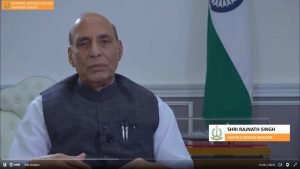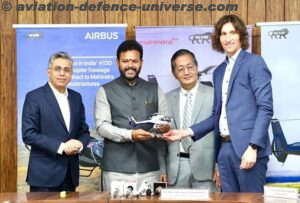- National Defence College’s Diamond Jubilee Celebrations begin

New Delhi. 06 November 2020. Rajnath Singh inaugurated Diamond Jubilee celebrations of the National Defence College (NDC) and delivered a key note address while declaring open of a two-day Webinar ( 05-06 Nov 2020) with the theme ‘India’s National Security- a Decade Ahead’.Singh said peace can only be ensured through the ability to deter war. “perhaps the most fundamental lesson that the roller coaster of the rise and fall of nations taught us was that peace cannot necessarily be achieved by a desire for peace but by the ability to deter war. Unfortunately, the mere desire to seek peace, if not reciprocated by others, does not necessarily succeed in building a harmonious environment in a world beset by conflicting ideas of security, sovereignty and national interests.” He outlined four broad principles that are likely to guide India’s quest for national security in the future. “The first is the ability to secure India’s territorial integrity and sovereignty from external threats and internal challenges. Second, the ability to create secure and stable conditions that can facilitate India’s economic growth, thereby, creating the resources for nation building and to meet individual aspirations. Third, we remain steadfast in the desire to protect our interests beyond the borders in areas where our people reside and our security interests converge. And finally, we also believe that in a globalised and interconnected world, a country’s security interests are interlinked by shared and secure commons.”
Rajnath Singh emphasised that India has proved that countries that employ terrorism as an instrument of national policy can also be deterred through options that were considered un-implementable in the past. He said “Pakistan continues to remain adamant in the use of terrorism as state policy. However, we have achieved substantial success in working with progressive and like-minded countries to not only expose Pakistan’s regressive policies but also make it increasingly difficult to continue with its previous business as usual approach.”
The Minister outlined India’s close relationships and partnerships with like-minded friends to further the common interests of countries in the region and beyond. “Our strategic partnership with the U.S. is stronger than ever before.” India’s friendship has also grown tremendously with Japan, Australia and Russia. India have also forged a very special partnership with reliable friends like France and Israel, he added.
One of the most important elements of India’s foreign and security policy is characterised by the “Neighbourhood First” initiative, he said. “Right from 2014, Prime Minister Narendra Modi invested substantial personal capital to ensure that this relationship was built and reinforced to create a positive and progressive partnership. The results of this initiative are evident. With the exception of Pakistan, given its agenda of fuelling terrorism, India has improved its relations with all neighbours. We have invested heavily to help and support our friends to forge a relationship of mutual-respect and mutual-interest.”
He further said Prime Minster Narendra Modi took special interest in reaching out to our partner countries in West Asia, South East and East Asia. “It is a result of this initiative that we have enhanced the scope and quality of our relations with Saudi Arabia, UAE and Oman in the West and with Indonesia, Vietnam and South Korea in the East. I see this trend further being enhanced over the next decade.”
Talking about India’s capability development and long term policy of indigenisation he said our recent procurement policies encourage “forging partnerships with major OEMs who are keen to invest and build in India. Our vision for Make in India for defence manufacturing is being implemented with the long-term of making India more self-reliant.”
Speaking about the evolving and changing character of war, Defence Minister said “a large number of initiatives have been undertaken by us in the recent past in this regard. At the structural level, India has a more closely interlinked and coordinated security network. We have not only made the appointment of Chief of Defence Staff, CDS, and established the Department of Military Affairs, but are also in the process of further integrating the armed forces through both theatre and functional commands.”
Talking about internal security challenges, he said a three-pronged approach has been undertaken. “This includes development of areas affected by terrorism along with the provision of justice to the aggrieved. It also includes the ability and desire to go more than half way to negotiate settlements with dissatisfied groups to enable a political settlement. And finally, we are also willing to challenge status quo, if the status quo becomes a tool for the exploitation of helpless citizens and the provisions of governance.”
On the larger issue of economic security, the Government has focused on all aspects of development in sectors of land, labour, capital and industry, he said.
Defence Secretary Dr Ajay Kumar and Commandant of NDC, Air Marshal D Choudhury also attended the Webinar.



























































































































